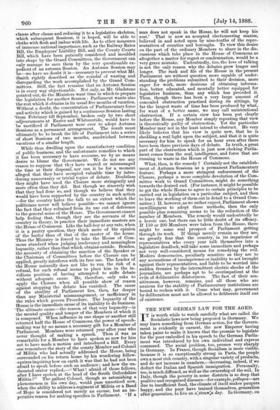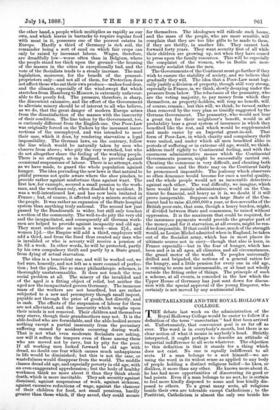THE NEW GERMAN LAW FOR THE AGED.
IT is worth while to watch carefully what are called the Socialistic laws now being proposed in Germany. We may learn something from German action, for the Govern- ment is evidently in earnest, the new Emperor having taken pains to make it known that the promise to legislate for the poor embodied in his speech to the German Parlia- ment was introduced by his own individual and express command. The social problem, too, presses very sharply in Germany. In France, though Socialism is more visible, because it is so exceptionally strong in Paris, the people own a most rich country, with a singular variety of products, and do not increase in numbers,—decreasing, indeed, if we deduct the Italian and Spanish immigration. Personalty, too, is much diffused, as well as the ownership of the soil. In Italy, though the poverty in some districts is so deep that positive and recognised diseases—for example, pellagra—are due to insufficient food, the climate of itself makes paupers happy, and the poor have trained themselves, generation after generation, to lire on a:straw:a day. In Germany, on the other hand, a people which multiplies as rapidly as our own, and which learns in barracks to require regular food with meat in it, possesses one of the poorest estates in Europe. Hardly a third of Germany is rich soil, the remainder being a sort of sand on which fair crops can only be raised by incessant labour. Wages, therefore, are dreadfully low—worse often than in Belgium, where the people stand too thick upon the ground—the housing of the masses in the cities is exceptionally bad, and the vote of the Socialists tends to a steady increase. The mad legislation, moreover, for the benefit of the peasant proprietorsonly—and not all of them, for Protection does not affect those who eat their own produce—makes food dear, and the climate, especially of the wind-swept flat which stretches from Hamburg to Moscow, is extremely unfavour- able to the poorly fed. The pressure, therefore, is sharp, the discontent extensive, and the effort of the Government to alleviate misery should be of interest to all who believe, as we do, that the great danger of modern Europe arises - from the dissatisfaction of the masses with the insecurity of their condition. The line taken by the Government, too, is curiously different from the English one. Our Poor-Law was originally forced on the Tudors by the incessant insur- rections of the unemployed, and was intended to meet their case, which it does, by rendering starvation a legal impossibility. The German laws, on the contrary, follow the line which would be naturally taken by men who observe from above; • who pity the very wretched, but who do not altogether share the feeling of the working people. There is no attempt, as in England, to provide against occasional suspensions of labour. There is no attempt, such as we have made, to guard the whole population against hunger. The idea pervading the new laws is that natural to pitiful persons not quite aware where the shoe pinches, to provide rather against misfortune than against want. The first law, for example, secured a small pension to the work- man, and the workman only, when disabled by accident. It was a well-intentioned law, and has now been imitated in France ; but, of course, it affected only a minute section of the people. It was rather an expansion of the State hospital system than anything truly national. The second law just passed by the Bundesrath is wider, but still only touches a section of the community. The well-to-do pity the very old and the incapacitated, and consequently all German work- men are helped to provide against incapacity and old age. They must subscribe so much a week—men 21-d., and women 1/4.—the Empire will add a third, employers will add a third, and from the fund thus created any man who is invalided or who is seventy will receive a pension of 2s. 6d. a week. In other words, he will be protected, partly by his own compulsory thrift and partly by a State grant, from dying of actual starvation.
The idea is a benevolent one, and will be worked out, we feel sure, honestly, and not left as a mere counsel of perfec- tion; but the plan, like so many philanthropic schemes, is thoroughly unstatesmanlike. It does not touch the true social problem at all. The misery of the invalided and of the aged is a fitting object of relief, but neither the aged nor the incapacitated govern Germany The immense mass of the workers are not benefited, but are rather subjected to a new and peremptory though small impost, payable not through the price of goods, but directly, and in cash. The effects of the suspension of labour for them are not alleviated, and the insecurity which weighs upon their minds is not removed. Their children and themselves may starve, though their grandmothers may not. It is the able-bodied who are formidable, and the able-bodied secure nothing except a partial immunity from the pecuniary suffering caused by accidents occurring during work. That is not what even moderate Socialists are asking, nor will it soften the tempers even of those among them who are moved not by envy, but by pity for the poor. If all working men looked forward to old age with dread, no doubt one fear which causes much unhappiness in life would be diminished; but this is not the case, or wastefulness would disappear from the world. The middle classes dread old age, and especially poverty in old age, with an even exaggerated apprehension ; but the body of healthy workmen think no more about it than they think about death, which is more inevitable. They ask security against dismissal, against suspensions of work, against sickness, against excessive reductions of wage, against the clamour of their children for food, not small pensions, hardly greater than those which, if they saved, they could secure for themselves. The ideologues will ridicule such boons,. and the mass of the people, who are more sensible, will complain that they are too like gifts to be made to them, if they are thrifty, in another life. They cannot look forward forty years. They want security first of all while their children are growing up, not when they have ceased to press upon the family resources. This will be especially the complaint of the women, who in Berlin are more furiously socialist than the men. The Governments of the Continent must go farther if they wish to ensure the stability of society, and we believe that gradually they will. The idea that a Poor-Law must logi- cally justify a division of property, though still very strong, especially in France, is, we think, slowly decaying under the- pressure from below. The reluctance of the peasantry, who. are the voting majority, to pay money from which they themselves, as property-holders, will reap no benefit, will, of course, remain ; but this will, we think, be turned, rather than removed by the very plan so timidly suggested by the German Government. The peasantry, who would not bear a great tax for their neighbour's benefit, would in all probability bear a great system of insurance in which they benefited like the rest, and which would be supplemented and made easier by an Imperial grant-in-aid. That form of Poor-Law, in which charity and compulsory thrift were united, and under which all men benefited alike in periods of suffering or in extreme old age, would, we think,. address itself rightly to Continental feeling, and with the enormous administrative means which the Continental Governments possess, might be successfully carried out. Cheating the commune is very difficult, and cheating both the commune and the State may on the Continent fairly be pronounced impossible. The jealousy which observers so often denounce would become for once a useful quality, and the whole people would act as inexorable detectives against each other. The real difficulty, we imagine, which here would be mainly administrative, would on the Con- tinent be financial, and heavy as it is, we doubt if it will prove insuperable. Suppose each large State of the Con-- tinent had to raise £5,000,000 a year, or five-sevenths of the- British poor-rate, that sum, though a heavy burden, might, if divided between State and communes, be raised without oppression. It is the maximum that could be required, for the insurance payments would provide the greater part of the money, and for it starvation, at all events, might be ren- dered impossible. If that could be done, much of the strength would, as Louise Michel admitted when in England, be taken out of the Socialist army, which has in most places its ultimate source not in envy—though that also is keen, in. France especially—but in the fear of hunger, which has. been and is in all ages, all climates, and all circumstances, the grand motor of the world. To peoples universally drilled and brigaded, the notions of a general ration for- the hungry, and a little pension for every one in old age,. is coming to seem not unreasonable, or at least not wholly outside the fitting order of things. The principle of such a scheme, at all events, is conceded in the law which the Upper House of Germany has just sent down for discus- sion with the special approval of the young Emperor, who certainly is not moved by any sentimental idea.



































 Previous page
Previous page